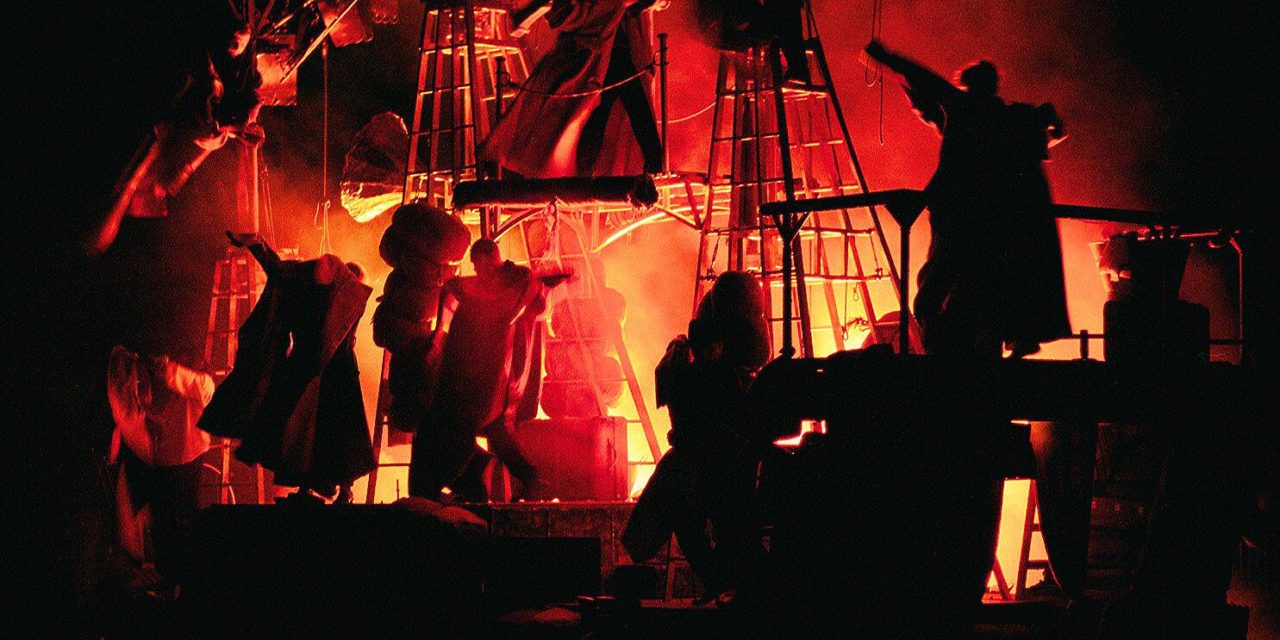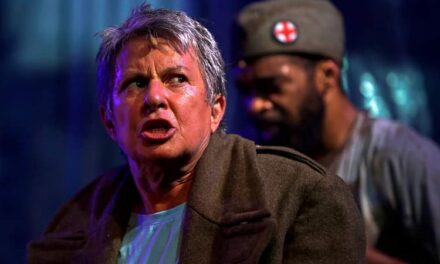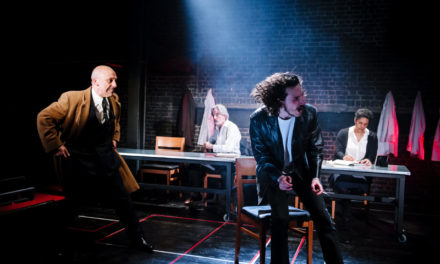The Theatre of the Eighth Day (Teatr Ósmego Dnia), from Poznań, has been a phenomenon of Polish independent theatre for 54 years. It is comparable to Jerzy Grotowski’s Laboratory Theatre or Tadeusz Kantor’s Cricot 2 Theatre. Like each of these theatres, it determined the area of its artistic autonomy. It was founded in 1964 by students of Adam Mickiewicz University in Poznań. As the students’ theatre of poetry, for the first few years it operated under the direction of Tomasz Szymański. They were closer to the legendary Rhapsodic Theatre of Mieczysław Kotlarczyk from the years of wartime occupation than to the theatres of the countercultural rebellion of the 1960s. Already by then, however, the Theatre of the Eighth Day marked their disagreement with the current reality. Stanisław Barańczak, one of the most talented poets of Generation ’68, joined the group. In the 1970s he was an activist in the anti-communist opposition movement. In 1972, his poetry was the basis for the performance In One Breath (Jednym tchem), a critical description of the reality of communism in Poland. (1)
The change of the stage form began two years after the group was founded, when Zbigniew Osiński became involved with it. He brought a fascination with Grotowski’s method. In the important 1968, Lech Raczak became the group’s leader. At the beginning of the 1970s, Ewa Wójciak, Adam Borowski, Tadeusz Janiszewski and Marcin Kęszycki joined the Theatre of the Eighth Day. After Raczak left in 1994, these actors were the group’s core.
The Theatre of the Eighth Day in historical context
The year 1968 was an important caesura around the world. It ends certain epoch in the history of Western civilization, which started with the conclusion of World War II. After the war, the world was divided into two poles. Eastern Europe was separated from the West by an Iron Curtain (W. Churchill). In the world of democracy under the American umbrella, post-war generations began to build a “welfare state”. Communism was built within the boundaries of the Soviet empire. After the Stalinist era behind the Iron Curtain, the Communists had to take into account, at least partially, the economic aspirations of society. In the meantime, in both the East and West, a new generation began to grow up. They did not remember the war, and middle-class aspirations seemed obvious. The changes in customs caused bourgeois culture to begin to feel suffocating, like a corset. In the 1960s, a rebellion against the “welfare state” of the parents’ generation began to grow. In the second half of the decade, it acquired the characteristics of a countercultural revolt. Paradoxically, it was noticeable in both parts of the divided world. In the West it was a contestation of the current lifestyle: home, school, work, family, with the traditional vision of male and female roles. The emancipation of women had entered a new phase. The revolt had its own specificity. Young people were asking uncomfortable questions. In the USA the revolt grew out of pacifism in response to the dirty war in Vietnam. Also important was disagreement over the conservatism of American culture (patriarchalism), traditional social divisions, racial segregation, sexism. A revolt against Protestant morality brought on the sexual revolution. In Germany Henrich Böll’s novel The Clown (Ansichten eines Clowns, 1963) became famous. The protagonist not only rebelled against the bourgeois way of life but also raised uncomfortable questions about the activity of his generation’s parents in the Nazi era. In France, questions were asked about the collaboration of the Vichy government, participation in the Holocaust, and war crimes in Vietnam and Algeria. The identities marginalized so far by republican historiography began to declare themselves. These included ethnic minority, gender (sexual), women’s herstory, workers, and religious narratives. Historian Pierre Nora described them as an “upsurge of memory”, which in the next decade changed the consciousness of the French. Charles de Gaulle and his patriarchalism became the symbol of the traditional “proud” France. A popular parody of the very tall president with excessive pride was the film character Ludovic Cruchot, a policeman, played by Louis de Funès. In the films about the Gendarme of Saint-Tropez (first film: Le Gendarme de Saint-Tropez / The Troops of St. Tropez, 1964), the police love of order, mediocrity and conservatism in response to the moral changes underway was amusing. On the barricades of Paris in May ’68, students protested against the culture of the bourgeoisie in the name of social, cultural and mental progress. Leftist intellectuals, for example Jean-Paul Sartre, accompanied them.
A similar rebellion against reality took place in the communist countries. Czechoslovakia and Poland were leading. The Prague Spring, an attempt to regain freedom, was pacified by tanks. In Poland, the apogee of the struggle for freedom and independence of culture came in March 1968. A year earlier, under the pretext of Polish Jews’ support for the Six-Day War, the communist regime began an anti-Semitic campaign. It was supported, unfortunately, by a significant part of Polish society. Many university professors, students, and elite representatives were forced to emigrate. The authorities began to radically limit freedom of speech. On 30 January 1968, Forefathers’ Eve (Dziady, directed by Kazimierz Dejmek) was dropped from the repertoire of the National Theatre in Warsaw. In the sentences of this drama by the romantic poet Adam Mickiewicz, Poles talked about matters important to themselves. During the communist era, only the First Secretaries of the Communist Party (dictators of state) could authorize productions of this drama. This event prompted student demonstrations, which peaked in a 8 March rally by students and “worker’s activists” at the University of Warsaw and was met with a crackdown by the police. Student protests also began in other academic centers: Cracow, Wrocław, Poznań and Gdańsk. The students were beaten, expelled from the university, imprisoned. Men were drafted into the army by force. The student movement was supported by intellectuals and artists. At the incidents of March ’68, well-known Polish oppositionists gained their first experiences. Decades later they co-created the Solidarity Movement. A rebellion against the system was born. It had left-wing but also definitely anti-communist roots.
![<em>Portiernia</em> [<em>The Porter’s Lodge</em>], Teatr Ósmego Dnia [Theatre Of The Eighth Day], photo by Marek Hoffman.](https://thetheatretimes.com/wp-content/uploads/2018/03/1.-fot.-Marek-Hoffman-The-Porters-Lodge-300x204.jpg)
Portiernia [The Porter’s Lodge], Teatr Ósmego Dnia [Theatre Of The Eighth Day], photo by Marek Hoffman.
The Theatre of the Eighth Day and its platform for social understanding
The Theatre of the Eighth Day crystallized in this atmosphere. Fascination with Grotowski’s method, the idea of the theatre of community, based only on aesthetic experience, has ceased to suffice. The group’s artists began to feel the need to build a platform for social understanding. The Theatre of the Eighth Day had become a politically involved theatre – a movement against the realities of the communist regime, the brutality of the secret police, surveillance, the violation of rights and human dignities. In the performance Inspection of a Scene of a Crime (Wizja lokalna, 1973), you can watch a society deprived of freedom from the scaffold. At the same time, the theatre was against conformism and consumerism. It showed the absurdities of everyday life in Poland in the 1970s, the era of Edward Gierek’s rule. Based on Dostoevsky (and other authors), We Must Confine Ourselves to an Earthly Paradise, Since That’s What They Call It…? (Musimy poprzestać na tym, co tu nazwano rajem na ziemi…?, 1975) was the group’s ideological manifesto. The play warns against totalitarianism as a consequence of the immaturity of the individual and escape from freedom (in the sense of E. Fromm). In the performances Sale for Everybody (Przecena dla wszystkich, 1977) and Oh, Have We Lived in Dignity (Ach, jakże godnie żyliśmy, 1979), questions about the ethical consequences of moral compromise are very important. The Theatre of the Eighth Day became a theatre of moral choices and intended to bring spectators out from their safe, conformist positions. Contestation of the system brought the Theatre of the Eighth Day to the Living Theatre (Judith Malina, Julian Beck) and the Bread and Puppet Theatre (Peter Schumann) in the West. The groups in the countries of democracy were contesting capitalism, and the Theatre of the Eighth Day, communism – in both cases from left-wing positions. The performance More Than One Life (Więcej niż jedno życie, 1981) created during the Solidarity “carnival” is about the civic maturation of Jan M. The spectacle is an anticipation of martial law, declared to the Poles by General Wojciech Jaruzelski. Martial law was a time of regime harassment of the group. After the prohibition against official activities, the group performed in Catholic churches. At that time important performances were created: A Fable (Przypowieść, 1982) and Ascent (Wzlot, 1982), dedicated to Osip Mandelstam, the great Russian poet and a victim of the Stalinist system. The allegory of Poland under martial law is the performance Report from the City under Siege (Raport z oblężonego miasta, 1983), inspired by the poetry of Zbigniew Herbert. The daily reality of the crisis of the 1980s is the subject of the Miracles and Meat (Cuda i Mięso, 1984) street action. Wormwood (Piołun, 1984), on the one hand, as Lech Raczak observes, is a reportage of Poles’ experiences of martial law. On the other hand, it is an expression of nostalgia for another (better?) world (2) – hope in the face of the surrounding reality.
Repression by the regime and the lack of a permanent location or funds for artistic activity led the Eighth Day actors to decide to emigrate. The authorities, seeking to close the theatre, issued passports to only half the group. To emphasize the group’s unity, performances were created based on the motifs of the same Tadeusz Konwicki novel: by the half who remained in Poland, A Minor Apocalypse (Mała apokalipsa), and for the emigré half, Auto-Da-Fé (1985). In the following years, the entire group settled in Ferrara, Italy. During their time there, they created several more performances: If on a Certain Day, in a Happy Town… (Jeśli pewnego dnia, w mieście szczęśliwym…, 1986), A Walk over the Ground (Spacer ponad ziemią, 1987) and Meat (Mięso, 1989).
Theatre of the Eighth Day in post-communist Poland
After Poland regained independence in 1989, the Theatre of the Eighth Day returned to the country. In contrast to such groups of the Polish avant-garde as the Laboratory Theatre or the Cricot 2 Theatre, they did not cease their artistic activity. The performance No Man’s Land (Ziemia niczyja, 1991) recalls the period of emigration and comes to terms with the period of terror, the madness of Europe. The dream of coming home is filled with fears and traumas of the past, as well as the terrible infatuation of the era: the generalissimo dance repeated by Western intellectuals. Ewa Wójciak interprets the title of the performance:
No man’s land was a strip of wasteland between lines of barbered wire, with searchlights and automatic guns, dividing East and West Berlin.
No man’s land is forty years of continuing effort to build a wall across Europe’s civilization.
No man’s land is a non existent gap in the wall, a chasm between us and you.
No man’s land is consciousness shaped by different historical experience.
No man’s land is conscience, remembrance, faithfulness. (3)
After returning to Poland, the Theatre of the Eighth Day did not crown themselves with laurels of combatants or artists fighting the system, after all being avant-gardist obliges. The group obtained a permanent seat in Poznań in a building where, in the 19th century, the German theatre was located. Without trying to capitalize from old fame, they joined the discussion on the problems of identity, society and culture in the changing Poland. Retaining their leftist sensitivity to poverty and social injustice, they expressed opposition to the absurdities of nascent capitalism. They were a sign of opposition to intolerance, racism, sexism, xenophobia and nationalism.
Opposing the current reality
Ewa Wójciak’s monodrama Requiem for Anna Akhmatova (Requiem dla Anny Achmatowej, 1992) is a tribute not only to the great Russian poet but also to a woman’s sensitivity capable of opposing totalitarian power.
Sabbath (Sabbat, 1993) is an open-air performance about the dark side of human nature and the temptation to enslave another human being – a spectacle about a bygone era, but still relevant. Dance, As Long As You Can (Tańcz, póki możesz, 1994) is the creed of the Theatre of the Eighth Day for the coming years: the announcement of further creative searches and the fight for a somewhat better and fairer world, a performance about fidelity to oneself and to one’s companions on the artistic journey.
Because what does it mean: dance as long as you can? It is a call, to give all you can give, against the odds set by fate and people. To fulfil one’s vocation: as an artist and as a human being, because in this action there is life, and in inaction there is death. (4)
After the departure of Lech Raczak in 1994, the group’s management included Ewa Wójciak. In the following years, two trends – interwoven and interlocked – can be distinguished in the work of the Theatre of the Eighth Day. The first trend concerns the omnipotence of the regime and the entanglement of the individual in its authoritarianism. The Summit (Szczyt, 1998) reveals the perversity of the ritual of government, the sexual pleasure of domination over others. The gesture of a student detaining a tank in Tiananmen Square acquires symbolic significance in the face of this power. The words of Tadeusz Kantor come to mind:
Against
these “powers”
stands the
S m a l l,
P o o r,
D e f e n c e l e s s,
but magnificent
history of
i n d i v i d u a l
h u m a n
l i f e. (5)
The Files (Teczki, 2007) shows another side of the dark relationship between a human and authoritarianism. The performance was based on denunciations, deposited at the Institute of National Remembrance, of the actors Ewa Wójciak, Tadeusz Janiszewski, Marcin Kęszycki and Adam Borowski. They show surveillance by the secret police of the Theatre of the Eighth Day. On the stage, the actors read their intimate dossiers, collected by police agents. Referring to the poetess of Kafka’s The Trial (Der Process, 1925), the performance shows the realities of the functioning of an independent theatre in a communist country. At the same time, it asks about the value of such natural human needs as friendship and confidence. The performance To Great and Just Authorities (Do władzy wielkiej i sprawiedliwej, 2012) is an analysis of denunciations written by Poles from the time of World War II and the Nazi occupation through the communist era up to the present day. At the same time, it asks about the motivations and psychological makeup of the denunciations’ authors.
Ceglorz/Factory (Ceglorz, 2013), performed in the largest factory in Poznań, the symbol of the first anti-communist uprising in Poland in 1956, has a different character. Locomotives and ship engines were once built there. Elements of constructivist scenography – platforms, scaffolding, wheels – coexist with authentic artifacts of the era: cranes, tools, oil smells, human sweat. Actors with naked torsos, metallurgy aprons, hammers in their hands, evoke the myth of the worker’s ethos. From loudspeakers you can hear oral history reports: memories of workers, men and women whose lives were associated with a large factory. And after its closure, many were affected by depression and a loss of meaning in life.
Examining alienation
The second group of performances treats the subject of alienation. The great open-air performance The Ark (Arka, 2000) is an epic story of contemporary nomads: nomads, refugees. People exiled by war, terror, hunger. It begins with an ordinary event: a wedding somewhere in the Balkans. Wine, singing, music and dances that integrate the community. The bridge separating the two districts of Mostar: Christian and Islamic. The sudden explosion of a bomb destroying the unity of the community. The apocalypse begins to be fulfilled: love gives way to hatred. Immigrants set out on the road. The Ark is a reminder that we live in a new era of migration of peoples. Nomads fleeing from hunger, war, nationalism, ethnic purges. Wandering miles in search of the Promised Land. Victims of postcolonial policy and economic globalization. In the performance’s epilogue, the rejected and excluded takes on its deck a large ship with developed red sails – a symbol of escape. Some of the refugees are at the borders of Poland, which transforms into The Porter’s Lodge (Portiernia, 2003), the gateway to the richer world. Poles at the beginning of the 21st century live in the euphoria of having entered the European Union. For many of them, the vision “of the end of history” (F. Fukuyama) is fulfilled. Meanwhile, history knocks at the door in the form of refugees from the contaminated land of Chernobyl, from besieged Grozny, Sarajevo, Mostar and Srebrenica. Poles, however, want to reject the community of fate shared for centuries with the worse and smaller nations. They are happy to take on the role of guards of the West Island of Happiness. A new wall is growing on the eastern border of Poland.
The Time of the Mothers (Czas Matek, 2006) is a feminist herstory: a performance that is a tribute to femininity, a story of sensitivity and compassion. Seeing the world rarely appearing in information websites and in history school-books. The delight of conception and the pain of childbirth, motherly tenderness expressed in the Greek word storge, followed by religion, politics, nationality, social relations divide children into oppressors and victims.
![<em>Czas Matek</em> [<em>The Time of Mothers</em>], Teatr Ósmego Dnia [Theatre Of The Eighth Day], photo by Przemysław Graft.](https://thetheatretimes.com/wp-content/uploads/2018/03/3.-fot.-Przemysław-Graf-The-Time-of-Mothers-300x201.jpg)
Czas Matek [The Time of Mothers], Teatr Ósmego Dnia [Theatre Of The Eighth Day], photo by Przemysław Graft.
The Theatre of the Eighth Day is a theatre of opposition. Opposition against non-human reality. Social and political commitment to fight for a slightly better world. The actors remain faithful to this mission.
Notes
1. The article discusses only selected performances of the Theatre of the Eighth Day.
2. Teatr Ósmego Dnia 1964–2009 / The Theatre of the Eighth Day, edited by P. Skorupska, Warsaw, 2009, p. 126. All fragments from this book translated into English by P. Stachura.
3. Ibid., p. 98.
4. E. Guderian-Czaplińska, in ibid., p. 74.
5. T. Kantor, “To Save from Oblivion [1988],” in M. Kobialka, editor and translator, A Journey through Other Spaces: Essays and Manifestos, 1944–1990, by Tadeusz Kantor (Berkeley; Los Angeles; London: University of California Press, 1993), p. 167.
6. Teatr Ósmego Dnia 1964–2009 / The Theatre of the Eighth Day, p. 27.
This post was written by the author in their personal capacity.The opinions expressed in this article are the author’s own and do not reflect the view of The Theatre Times, their staff or collaborators.
This post was written by Klaudiusz Święcicki.
The views expressed here belong to the author and do not necessarily reflect our views and opinions.


















